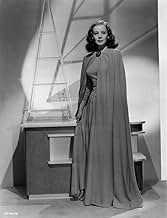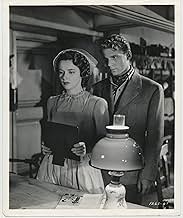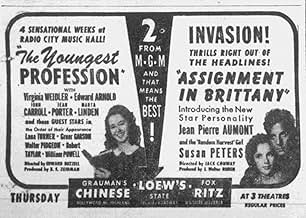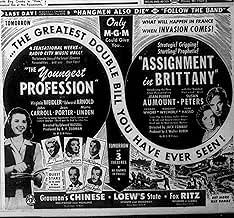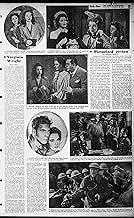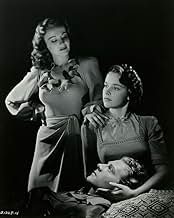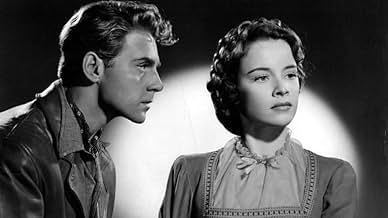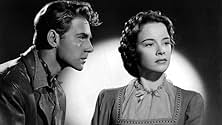CALIFICACIÓN DE IMDb
6.7/10
354
TU CALIFICACIÓN
Agrega una trama en tu idiomaA French captain (Jean-Pierre Aumont) poses as a Nazi to pinpoint a U-boat base off the coast of France, while assuming the identity of a look-a-like French citizen.A French captain (Jean-Pierre Aumont) poses as a Nazi to pinpoint a U-boat base off the coast of France, while assuming the identity of a look-a-like French citizen.A French captain (Jean-Pierre Aumont) poses as a Nazi to pinpoint a U-boat base off the coast of France, while assuming the identity of a look-a-like French citizen.
- Dirección
- Guionistas
- Elenco
Jean-Pierre Aumont
- Bertrand Corlay
- (as Pierre Aumont)
- …
Opiniones destacadas
Darryl Hickman is WAY down in the cast list, but he's about the only name i recognize. you'll also know Reginald Owen, the stately old gentleman in SO many huge films... he was never the lead, but an important co-star in so many great productions. check out his roles. In this war-time flicker, a frenchman poses as another office to locate a german submarine base. Jean-Pierre Aumont plays several roles.... to the french, he's a captain in the french army. then he parachutes to where "his" fiancee is, and must find the submarine base. the usual espionage shenanigans. darryl hickman was only 12 at this time, so he's just a boy. Sixteen years later, he'll be Dobie Gillis, in 1959, with his own television series. the war had another two years to go, so we see the rough sacrifices the villagers had to make repeatedly, to thwart the german troops. it's pretty good. some violence, as they gun down the innocent (and some not so innocent) towns-people. Directed by Jack Conway, who had also directed some incredible films.
This is a wartime film obviously intended to bolster the public's resolve. It stars a French expatriate, Jean-Pierre Aumont, who came to Hollywood when his country fell to the Germans. Unfortunately, not too many other French actors were available...and those who SHOULD have had French accents never even tried. So, it's all a bit strange with Aumont the only French person in a film set in a France where everyone has American and British accents!! Just suspend your sense of disbelief and watch.
The story is a bit silly but enjoyable. It seems that a French agent cannot go back to his native land for an assignment due to an injury. But, they manage to find a Free-French officer, Pierre (Aumont) who looks a lot like him. And, after a bit of plastic surgery, voila...the man has a double who will do the assignment for him! His job is to locate the secret German submarine bases so they can be destroyed. And, until he locates them, Pierre is to assume the other man's life...living withe man's mother and interacting with his friends.
The story that follows is rather typical of a wartime film. However, the Germans are not quite as monstrous as they often were in WWII- era films--as the filmmakers were going more for realism in this instance. Overall, it's enjoyable but a tad dumb. Turn off the part of your brain that questions silly plot lines and you'll no doubt enjoy this generally well made film.
The story is a bit silly but enjoyable. It seems that a French agent cannot go back to his native land for an assignment due to an injury. But, they manage to find a Free-French officer, Pierre (Aumont) who looks a lot like him. And, after a bit of plastic surgery, voila...the man has a double who will do the assignment for him! His job is to locate the secret German submarine bases so they can be destroyed. And, until he locates them, Pierre is to assume the other man's life...living withe man's mother and interacting with his friends.
The story that follows is rather typical of a wartime film. However, the Germans are not quite as monstrous as they often were in WWII- era films--as the filmmakers were going more for realism in this instance. Overall, it's enjoyable but a tad dumb. Turn off the part of your brain that questions silly plot lines and you'll no doubt enjoy this generally well made film.
Solid story, I think well done and paced nicely for modern sensibilities even. Dramatic scenes jump to quite harrowing action without warning, and play out realistically. A relatively simple, high-stakes spy/war plot, clearly resolved. Nice bits of play acting, being discovered, double agents, etc. etc.
Some here complain about the acting, but I thought it all worked great, and the supporting cast really held up their end; even people on screen for two minutes seem real, and to be motivated by actual emotion.
Not a great transfer, and hard to watch but I caught it on TCM. Nicely done sets, and mostly works within the confines of budget by keeping things indoors and at night. The few outdoor scenes (especially those in the day) are a bit lame in the backlot/studio way they were, but that's about the only flaw I can find in it.
Some here complain about the acting, but I thought it all worked great, and the supporting cast really held up their end; even people on screen for two minutes seem real, and to be motivated by actual emotion.
Not a great transfer, and hard to watch but I caught it on TCM. Nicely done sets, and mostly works within the confines of budget by keeping things indoors and at night. The few outdoor scenes (especially those in the day) are a bit lame in the backlot/studio way they were, but that's about the only flaw I can find in it.
First, let's start with the very clear purpose of this movie - because, during World War II, when Hollywood made a movie about the war, it had clear reasons for doing so.
When the Germans invaded France (and Belgium and Holland) in May, 1940, it quickly became apparent that the (then) Allies were unprepared for Blitzkrieg, (Why and who was to blame is a story for another day.) By June France was overrun and the French army, what was left of it, was quite simply fleeing before the German invaders. The French government, as unprepared as the French army, turned over power to the very conservative Philippe Pétain, a World War I hero, and he negotiated an armistice with the Germans. The French therefore stopped fighting - except for those who fled to England to continue the fight under Ch De Gaulle. Here in the States, that was depicted in large headlines as "The French Quit."
FDR realized that France could not be written off as a nation of collaborators, because if we were ever to defeat the Germans, we would have to land there. And so, Hollywood was directed to find ways of showing that not all the French were Nazi sympathizers. (On this, see the very useful book Hollywood Goes to War: How Politics, Profit and Propaganda Shaped World War II Movies.) This led to movies like *Reunion in France* (1942), *Paris After Dark* (1943), and this movie. Its first purpose was to show that, while there were indeed collaborators among the French, there were also brave anti-Nazis - there is no indication of a real organized Resistance in this movie.
The second purpose of this movie was evidently to appeal to women with a love story and a very handsome leading man, the French actor Jean-Pierre Aumont, in what was evidently his first American movie. (His English is very good.) I found this love story, with Susan Peters, to be of no interest at all. There's no chemistry between them at all. That's probably why the movie is now forgotten. Aumont was better looking than Bogart, but Peters couldn't hold a candle to Bergman - no woman could - and their scenes together are of no interest.
What I found interesting about this movie, which was probably filmed very quickly - the novel on which it was based came out just the year before, in 1942 - is that, despite the title, it presents a very generic, and indeed non-Breton Brittany. It takes place near St. Lunaire, in the Côtes d'Armor, where I have lived for 20 years, and I can assure you that none of the architecture, and almost none of the costumes, look like what one sees, or would have seen, there. Even the names are not Breton. (I don't know if they are the same as in Helen MacInnes' novel.) Why MGM didn't bother to go for something more authentic I can't guess, since they certainly had the resources to do so. Perhaps it was because they figured that Americans in 1943 and before, even those who had traveled to France, were unlikely to have known Brittany. (That seems to be symbolized by the final image, Mont St. Michel, which American tourists would have visited, but which is in Normandy.) Perhaps it was just because they were in a rush and didn't want to bother.
No one, but no one, who knew Brittany at the time would have believed for one moment that a Frenchman from another part of France - Métard/Aumont is presented as being from NE France - could have passed for a small-town Breton for even 30 seconds once he opened his mouth and started speaking French with a non-Breton accent. Whether that is dealt with in MacInnes' novel I don't know.
So, is there anything to recommend here, since the love story and even the basic premise of Métard passing for a small-town Breton are unconvincing? I found the staging of the attack on the submarine base to be well done. Yes, the torpedo boats are clearly toys floating in something like a bathtub. But other than that, I thought that part of the movie was well done. (The director, Jack Conway, had done some great action movies, like *Vivo Villa* and *A Tale of Two Cities*.)
When you watch this movie - and I hope you will, if you're interested in World War II - I hope you'll try to watch it as Americans would have seen it in 1943, a time when we had just entered the war and no one knew if the Germans would retain control of Europe. That gives it a power that an ahistorical viewing does not have.
When the Germans invaded France (and Belgium and Holland) in May, 1940, it quickly became apparent that the (then) Allies were unprepared for Blitzkrieg, (Why and who was to blame is a story for another day.) By June France was overrun and the French army, what was left of it, was quite simply fleeing before the German invaders. The French government, as unprepared as the French army, turned over power to the very conservative Philippe Pétain, a World War I hero, and he negotiated an armistice with the Germans. The French therefore stopped fighting - except for those who fled to England to continue the fight under Ch De Gaulle. Here in the States, that was depicted in large headlines as "The French Quit."
FDR realized that France could not be written off as a nation of collaborators, because if we were ever to defeat the Germans, we would have to land there. And so, Hollywood was directed to find ways of showing that not all the French were Nazi sympathizers. (On this, see the very useful book Hollywood Goes to War: How Politics, Profit and Propaganda Shaped World War II Movies.) This led to movies like *Reunion in France* (1942), *Paris After Dark* (1943), and this movie. Its first purpose was to show that, while there were indeed collaborators among the French, there were also brave anti-Nazis - there is no indication of a real organized Resistance in this movie.
The second purpose of this movie was evidently to appeal to women with a love story and a very handsome leading man, the French actor Jean-Pierre Aumont, in what was evidently his first American movie. (His English is very good.) I found this love story, with Susan Peters, to be of no interest at all. There's no chemistry between them at all. That's probably why the movie is now forgotten. Aumont was better looking than Bogart, but Peters couldn't hold a candle to Bergman - no woman could - and their scenes together are of no interest.
What I found interesting about this movie, which was probably filmed very quickly - the novel on which it was based came out just the year before, in 1942 - is that, despite the title, it presents a very generic, and indeed non-Breton Brittany. It takes place near St. Lunaire, in the Côtes d'Armor, where I have lived for 20 years, and I can assure you that none of the architecture, and almost none of the costumes, look like what one sees, or would have seen, there. Even the names are not Breton. (I don't know if they are the same as in Helen MacInnes' novel.) Why MGM didn't bother to go for something more authentic I can't guess, since they certainly had the resources to do so. Perhaps it was because they figured that Americans in 1943 and before, even those who had traveled to France, were unlikely to have known Brittany. (That seems to be symbolized by the final image, Mont St. Michel, which American tourists would have visited, but which is in Normandy.) Perhaps it was just because they were in a rush and didn't want to bother.
No one, but no one, who knew Brittany at the time would have believed for one moment that a Frenchman from another part of France - Métard/Aumont is presented as being from NE France - could have passed for a small-town Breton for even 30 seconds once he opened his mouth and started speaking French with a non-Breton accent. Whether that is dealt with in MacInnes' novel I don't know.
So, is there anything to recommend here, since the love story and even the basic premise of Métard passing for a small-town Breton are unconvincing? I found the staging of the attack on the submarine base to be well done. Yes, the torpedo boats are clearly toys floating in something like a bathtub. But other than that, I thought that part of the movie was well done. (The director, Jack Conway, had done some great action movies, like *Vivo Villa* and *A Tale of Two Cities*.)
When you watch this movie - and I hope you will, if you're interested in World War II - I hope you'll try to watch it as Americans would have seen it in 1943, a time when we had just entered the war and no one knew if the Germans would retain control of Europe. That gives it a power that an ahistorical viewing does not have.
I can't remember the exact year, but my mother and I were invited to an evening at the Uptown Theatre in Toronto, Ontario for a special screening of Assignment in Brittany in aid of the Free French movement. It was a very exciting time for me, and Jean Pierre Aumont was there in person. I was 14 or 15 at the time, and I have never forgot the evening. Our tickets were a gift from a french teacher at the Cental High School of Commerce. It was a gala evening, in spite of the fact that war was raging in Europe and the Pacific. I was of an age when I was entranced by movie stars, and to see Mr. Aumont in person was a dream come true.
I wonder if there are others who attended that show. Mr. Aumont was introduced, and spoke at length about the Free French movement, and encouraged donations to support them. I enjoyed the picture very much, as did my mother. There was a reception after the screening, where we were introduced to Mr. Aumont, a very gracious man. Perhaps it was the fact that the war had been on for it seemed forever, and the picture showed what ordinary citizens could do to help defeat the enemy. Certainly, although we did not suffer the devastation of actually being occupied or bombed, we were well aware of the loss of our dear family and friends. There were many films made about the war but this seemed special because of the appearance of people who had direct connection with the Free French movement, and we were hearing about it first hand.
I wonder if there are others who attended that show. Mr. Aumont was introduced, and spoke at length about the Free French movement, and encouraged donations to support them. I enjoyed the picture very much, as did my mother. There was a reception after the screening, where we were introduced to Mr. Aumont, a very gracious man. Perhaps it was the fact that the war had been on for it seemed forever, and the picture showed what ordinary citizens could do to help defeat the enemy. Certainly, although we did not suffer the devastation of actually being occupied or bombed, we were well aware of the loss of our dear family and friends. There were many films made about the war but this seemed special because of the appearance of people who had direct connection with the Free French movement, and we were hearing about it first hand.
¿Sabías que…?
- TriviaThe Germans built several submarine bases on the west coast of France after their occupation of the country in 1940. Enormous submarine pens of reinforced concrete were erected at Bordeaux, Brest, La Pallice, Lorient and Saint-Nazaire. These structures protected the U-Boats from attack and allowed them freer access to the Atlantic Ocean, as the submarines did not have to transverse the English Channel or go around the UK via the North Sea from bases in Germany. As of 2020 these massive constructions are still largely intact and some have even been re-purposed. The pens at La Pallice can be seen in El submarino (1981) and Los cazadores del arca perdida (1981).
- ErroresAs Corlay and Kerenor are about to enter the pub, a German guard stops them. Kerenor says, "One uncovers. It's good form for the content." They take their hats off and enter. But once inside, only they have their hats off. All the other Frenchmen of the town, and the German officers, have their hats on their heads.
- Citas
Jean Kerenor: [as he and Metard/Corlay are stopped by a guard from entering a pub] One uncovers. It's good form for the content.
[German officers as well as town folk are seated inside]
Selecciones populares
Inicia sesión para calificar y agrega a la lista de videos para obtener recomendaciones personalizadas
Detalles
- Tiempo de ejecución1 hora 36 minutos
- Color
- Relación de aspecto
- 1.37 : 1
Contribuir a esta página
Sugiere una edición o agrega el contenido que falta

Principales brechas de datos
What is the Spanish language plot outline for Cita con el peligro (1943)?
Responda
